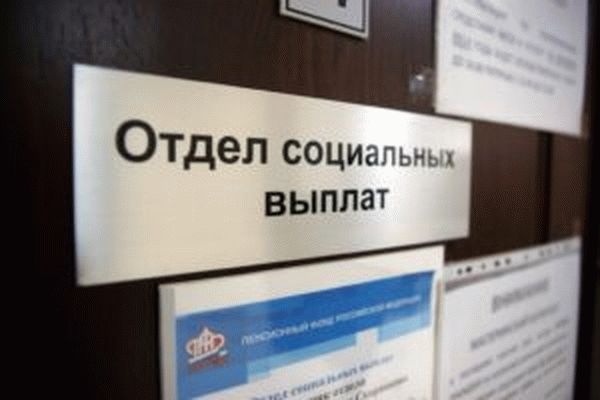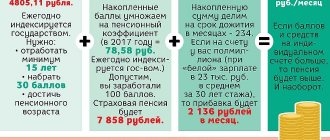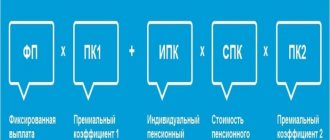What exactly is the difference between an insurance pension and a social pension?
Insurance pensions are monthly material payments proportional to the amount of wages or other income received by a citizen of the Russian Federation while working.
This type of pension applies to pensioners themselves, as well as members of their families in the event that the insured pensioner dies. In addition to insurance and labor pensions, there are social pensions, which are more appropriately called benefits.
There are two categories of social pensions - social pension upon reaching retirement age, as well as social benefits for disabled people or persons who have lost their breadwinner. Now let's look at each type of social pension:
Conclusions and recommendations
- In modern Russia there are 3 types of pensions: social, labor, insurance.
- The most relevant for today's pensioners is the labor pension, since it is accrued to those who worked in the period from 2002 to the next pension reform at the end of 2013.
- A characteristic difference between a labor pension and an insurance pension is the presence of work experience during the 11-year period specified by law between the two reforms.
- In order to find out the size of your retirement pension, use the formulas given in our article.
Author
Breslav Lev Andreevich
Your comments are very important and allow us to identify truly useful materials that are interesting to a wide range of people. Don't forget to rate publications and share your opinion with other site members.
Concept, essence, meaning of benefits and their difference from other types of material payments
- Social assistance to certain categories of needy citizens (hereinafter referred to as Social Assistance) is provided in the form of free services, in the form of cash payments and in the form of exemption from fares on urban passenger transport routes.
- Social assistance is provided by separate types of support:
- social assistance in the form of free services;
- social assistance in the form of cash payments.
- social assistance is provided in accordance with the budget program “ Social assistance to certain categories of needy citizens according to decisions of local representative bodies” , the administrator of which is the state institution “ Department of Employment and Social Programs of the City of Astana ”, and within the limits of the funds provided in the city budget for these purposes for the corresponding financial year [13].
It is necessary to distinguish between a pension and social benefits, as it has a number of distinctive features. A pension is a long-term monthly payment of cash from the Center or accumulative pension funds as the main source of livelihood for persons who have reached the age established by law, as well as for length of service, disability, loss of a breadwinner [6, p. 64].
First, let’s figure out what all these concepts mean and what meaning they carry. Let's start with the general concept of pension.
A pension is a monthly cash payment assigned to persons specified in the law as the main source of livelihood in specified cases. The legislation can distinguish between state pensions and labor pensions.
The pension is provided to citizens in order to compensate them for earnings (income) lost in connection with the termination of the federal state civil service upon reaching the length of service established by law upon retirement from an old-age (disability) insurance pension; Art. 2 Federal Law “On State Pension Provision in the Russian Federation” dated December 15, 2001 N 166-FZ (latest edition)
The legal framework regulating these categories is determined by the following legislative acts:
- Federal Law of December 15, 2001 N 166-FZ (as amended on December 27, 2018) “On state pension provision in the Russian Federation”;
- Federal Law “On Labor Pensions in the Russian Federation” dated December 17, 2001 N 173-F
- Federal Law “On Insurance Pensions” dated December 28, 2013 N 400-FZ
Benefits are monthly, periodic or one-time cash payments provided to citizens to compensate for lost earnings or as social support in cases established by law.
Social benefits are the gratuitous provision of a certain amount of money to citizens at the expense of the corresponding budgets of the budget system of the Russian Federation.
Differences between a pension and an allowance:
-purpose, the only difference.
Benefit – additionally compensates for loss of earnings; material support.
Pension is for the full provision of a citizen.
Benefit - certain advantages, additional rights, full or partial exemption from fulfilling established rules, obligations, or facilitating the conditions for their fulfillment.
The right to benefits, i.e. receipt of state social assistance (GSAs) for certain categories of citizens is determined by Federal Law of the Russian Federation No. 178-FZ of July 17, 1999 “On State Social Assistance.
Considering the benefits, the following functions can be distinguished:
- ensure equality in society (assistance to families with two or more children, disabled people and young children)
- a method of rewarding citizens who have a special status in society and the state (benefits for WWII veterans, families of deceased military personnel, etc.)
- remuneration for certain working conditions (mine workers, military personnel, Russian Railways employees, etc.)
- an stimulating tool for categories of citizens combining work and study.
Compensations are monetary payments established for the purpose of reimbursement of costs.
Difference between compensation and benefits:
A benefit is a complete exemption from various requirements, rules or their partial mitigation. As a rule, this service is not a material reward.
Compensation, on the contrary, implies a certain payment that will compensate for losses, expenses, and in some cases is aimed at motivating the work of employees.
The project “Center for the Protection of the Rights of Persons with Disabilities” is being implemented by the “Without Barriers” Foundation with the support of the Presidential Grants Fund and the NGO Resource Center of Moscow / Address: Varshavskoe highway no. 76, building 2 (by appointment) Contact phone number: 8 (985) 448-8-448
Subscribe to our groups: VK https://vk.com/club51676628 FB https://www.facebook.com/Barrierfree.ru OK https://ok.ru/group/54575182053590 Instagram https://www.instagram. com/barrierfreeru
#FundWithoutBarriers #withoutbarriers #center for the protection of rights of disabled people #rights of disabled people #presidential grants fund #help #disabled people
Support the Project to number 3434 message Dream_500
TIN 7726379409 KPP 772601001 account number 40703810638060068146 in PJSC Sberbank of Russia, BIC 044525225, account number 30101810400000000225
Similar
Author of the publication
offline 1 year
11sportsmen1995
Comments: 0Publications: 6Registration: 03/20/2019
Spread the love
The concept of a pension, characteristics of pensions, differences between pensions and benefits and wages
Pension (A.D. Zaikin) is a monthly social and alimentary payment assigned to persons who have lost their breadwinner and other categories of citizens in connection with past socially positive activities in an amount that is usually commensurate with wages and was the main source of livelihood .
Pension in Latin means “payment.” In order to understand the essence of a pension, its legal nature, it must be distinguished from two payments (from payment under an employment contract and from social security benefits).
Rules for determining the amount of benefits under the social security system
The concept of social security and extra-budgetary funds. Basic principles of social security: accessibility, universality. Analysis of calculation of old-age pensions. Types of health insurance: voluntary, compulsory. Social benefits.
History of development and general characteristics of benefits in the Russian Federation. Features of calculation and amounts of benefits in the Russian Federation. Ways to solve social security benefit legislation problems related to social benefits.
Necessary documents for registration
Required package of documents
To apply for an insurance pension, the applicant must provide the following documents to the relevant authority:
- identification;
- certificate of compulsory pension insurance;
- a document certifying the place of residence - in the absence of registration;
- a document confirming your place of residence, if it differs from your place of registration;
- identification card of the representative and a document certifying his authority.
When applying for old-age benefits, you must additionally provide information about periods of employment and the individual pension coefficient.
To apply for disability payments, the applicant submits a certificate of disability and the same information that is necessary to apply for an old-age pension.
If you lose a breadwinner, you must provide information about dependents and documents confirming the facts of relationship with the deceased, information about the education of the dependent, and the absence of able-bodied parents.
To receive additional payments, documents are required depending on the specific case (work in difficult conditions, in the Far North, presence of disabled people in the family, etc.).
Concept, essence, meaning of benefits and their difference from other types of material payments
Activities of the Office of the Ministry of Social Development, Guardianship and Trusteeship. Financial support for the costs of paying benefits to citizens with children. Financial support for labor veterans. Improving the system of social protection of citizens.
Globalization and changes in social policy. Basic elements of protection systems. Experience of the USA, some examples of individual countries of Western Europe. Social passport program in Chile, family benefits in Armenia. Lessons on targeting and federalism in Russia.
How is a labor pension established, how is it different from an insurance payment?
According to the Federal State Statistics Service, inflation growth in 2020 was 5.4%. In this regard, it was planned to bring the indexation coefficient to a value of 1.054 with an individual pension coefficient equal to 78.28 rubles.
It guarantees that the insured person (an employee to whose account his employer made mandatory contributions) upon the occurrence of an insured event (retirement) receives compensation - a pension benefit formed from contributions from the employer.
Individual pension coefficient
What is IPC?
The amount of the insurance pension largely depends on the individual pension coefficient.
This coefficient is used to calculate payments regardless of the years in which the person worked.
The IPC is established on the day of appointment of payment of pension benefits. Its value is influenced by the coefficient values that were in effect before the first day of 2020 and after this date.
Their amount is multiplied by the value of the increasing coefficient in the case of calculating benefits for family members who have lost their breadwinner and people retiring in old age.
The concept of an individual pension coefficient was introduced on January 1, 2020. As of 2020, its maximum value is 8.26.
Social benefits and pensions – what will change
For workers, this amount may be higher and should be 40% of the average earnings on which insurance premiums are calculated. From January 1, 2011, maternity benefits are calculated based on average earnings calculated over two calendar years. At the same time, the maximum earnings amount is 512,000 rubles for 2012 and 568,000 rubles for 2013. As for the monthly child benefit for low-income families, the procedure for its assignment and payment is established by the legislation of the constituent entities of the Russian Federation.
Military personnel with service from 15 to 20 calendar years, dismissed without the right to a pension for length of service or due to disability (for health reasons, organizational and staffing events, due to violation of the terms of the contract in relation to the employee, upon reaching the age limit) with 15 years of service a monthly social benefit is paid in the amount of 40% of the amount of salary (salary according to military rank and military position), plus 3% for each year over 15 years. This benefit is paid for 5 years from the date of dismissal. If the length of service is less than 15 years, a salary according to military rank is paid for 1 year.
We recommend reading: How to obtain a marriage certificate for a deceased relative
Payment of labor pension
All types of insurance pensions are paid monthly for the current period . A pensioner can receive a pension payment personally or through a proxy. The pension established for the child is received by one of the parents or guardian. A fourteen-year-old child can receive a pension independently.
The method of delivery of pension payments is chosen by the citizen when writing an application for appointment . However, this method may be by submitting a corresponding application to the Pension Fund.
Payment of pension benefits is carried out :
- through post office institutions (at home or at the post office);
- through the bank.
Suspension and termination of payment
grounds for suspending pension payments:
- failure to receive such payments within six months;
- failure of a disabled citizen to appear for the next re-examination;
- the pension recipient has reached the age of majority and has no documents confirming his full-time studies, or has completed his studies after the age of 18;
- termination of the residence permit;
- receipt of documents on the departure of a pensioner for permanent residence in a foreign state, with which an agreement has been concluded on the obligations of this state to provide pensions to our citizens;
- receipt of documents on moving for permanent residence to a foreign country with which an international treaty has not been concluded, and the absence of an application to leave Russia.
The suspension or termination of payment of the pension amount is carried out from the 1st day following the month in which such circumstances occurred.
grounds for termination of pension payments:
- death of the pension recipient or recognition as missing;
- the expiration of six months from the date of suspension of payment;
- loss of the right to an assigned type of pension;
- failure by a foreign citizen or stateless person to provide a residence permit;
- refusal to receive insurance payment.
It should be remembered that a citizen is obliged to promptly notify the Pension Fund of the Russian Federation about circumstances entailing the suspension or termination of pension provision.
Difference between Benefit and Pension
A special type of social assistance is medical assistance. In case of illness, loss of ability to work and in other cases, citizens have the right to medical and social assistance, which includes preventive, therapeutic and diagnostic, rehabilitation, prosthetic and orthopedic and dental care, as well as assistance in caring for the sick, disabled and disabled, including the payment of benefits on disability.
Unlike pensions - a permanent and main source of livelihood - benefits, as a rule, are assistance that temporarily replaces lost earnings or serves as an addition to the main source of livelihood (earnings or pension).
Differences between a pension and social security benefits
Based on the legislation in force in the Republic of Crimea, as of February 21, 2014, a disability pension is assigned for the entire period of disability determination, if the application for a pension occurred no later than 3 months from the date of disability determination. In other cases, from the date of application.
- The most common type is old age pension . Upon reaching retirement age, a citizen must submit an application to the Pension Fund for accrual of payments. The basis is a certificate of compulsory pension insurance.
- An insurance pension due to disability is assigned if a person has received a disability, regardless of the group. In this situation, insurance experience is also required. Considering that it is the same for any type of pension, the great importance of paying regular contributions should be emphasized. It is necessary to provide the following documents: applications for accrual of pensions, passports, certificates of payment of insurance premiums, extracts from a document about a medical examination recognizing a disability, a certificate of disability.
- Insurance includes income compensation payments assigned to family members who are disabled and have lost their breadwinner . It is available provided that they were supported by a deceased relative. These legal norms include children and grandchildren who have not reached the age of majority. These may be relatives who are under 23 years of age and studying at one of the educational institutions. The parents, husband or wife of a breadwinner who has reached retirement age or is disabled are also granted this right.
Categories of citizens entitled to payments
The category of persons entitled to a social pension includes disabled citizens who are unable to work due to health or age, namely:
| Type of payment | Category of persons entitled to payments |
| By disability |
|
| On the occasion of the loss of a breadwinner |
|
| By old age |
|
The same categories of persons can receive an insurance pension as a social pension: old-age pensioners, children who have lost their breadwinner(s), as well as the disabled. However, in this case, the assignment of a pension is possible only if the following conditions are met:
| Type of payment | Conditions of appointment |
| By disability |
|
| On the occasion of the loss of a breadwinner |
|
| By old age |
|
Difference between Benefit and Pension
It has already been said above, upon the occurrence of which particular insured events, the insured have the right to receive one or another benefit, and the types of these benefits were also named. A distinctive feature of benefits provided to the insured at the expense of extra-budgetary funds is that their size is proportional to the amount of earnings that they reimburse in full or in part.
Benefits can also be classified according to the duration of their payment.
According to this criterion, benefits are distinguished: one-time, monthly, periodic. The types of benefits mentioned above are an example of one-time benefits. They also include, for example, benefits for working women who are registered with medical institutions in the early stages of pregnancy; benefits for the pregnant wife of a military serviceman undergoing military service; benefits when placing a child in a family for upbringing. Monthly benefits are: for child care until he is one and a half years old; for the child of a serviceman undergoing military service; on unemployment. An example of a periodic benefit is a temporary disability benefit (for the period of temporary disability); maternity benefit (for the period of prenatal and postnatal leave).
What are state social payments

This is interesting: One-time payment to pensioners from the funded part of the pension
Funds are allocated free of charge in the following cases:
- For partial or full compensation of temporarily lost income (unemployment benefits, temporary disability benefits, maternity benefits, etc.).
- Providing financial support when expenses increase (assistance for the birth of a child, funeral expenses, for families with children under 16 years of age, etc.).
Social benefits serve as a form of state social security for the population and are regulated by federal legislation.
Characteristic features of social benefits
The benefit differs from other types of social payments in that the funds are transferred directly to the beneficiary and do not depend on the type of social support or the preferential category of the applicant.
This type of payment has certain features:
When assigning social benefits, the following factors are taken into account:
Each of the above factors may be grounds for seeking support from the state.
Do you need expert advice on this issue? Describe your problem and our lawyers will contact you as soon as possible.
Federal and regional social payments
In many cases, federal benefits are a significant addition to the recipient's basic income, and sometimes the only source of income.
Federal payments in Russia are assigned:
- Citizens who have certain services to the state (title or awards): Hero of the USSR, Russian Federation, Honorary Donor of Russia.
- Persons who have received national status: labor veterans and disabled people, rehabilitated citizens, home front workers, the unemployed, etc.
Federal payments are financed from the federal budget. Money is allocated on a target basis to the relevant ministries and departments, which distribute the budget for the calendar year.
Regional payments are established in each region independently by the local administration. The allocation of funds occurs at the expense of regional budgets and therefore may differ in size or be completely absent in some regions (krai).
Regional assistance is intended for people who are most in need of additional measures of social support from authorities. For example, pensioners, labor veterans, citizens with extensive work experience.
Certain types of support are paid directly by the applicant's employer. In the future, these funds will be compensated from state funds.
Social and insurance pension: what is the difference
Social and insurance payments are quite similar, they are replacement and are of a purely applicant nature. That is, no one will bring anything on a silver platter until the future beneficiary himself applies to the relevant authorities with a request to accrue payments.
Social security, contrary to popular stereotypes, not many people apply for and regularly receive social security, only from two to five percent of the total number of pensioners in our country. According to the law, such security can also be of three main types, but the terms of assignment are somewhat different. To receive financial assistance from the state, it is not at all necessary to provide a certificate of employment or insurance experience. In essence, social payments are minimal material benefits that will allow you to survive in a difficult situation.
The procedure for assigning and paying insurance pensions
What is the procedure for assigning payments?
The assignment of a pension and payment procedure is carried out by the pension authority or a multifunctional center providing state and municipal services at the place of residence of the citizen who applied for it.
Based on a written application from an employee, his employer may apply for the pension assigned to him.
You can apply for a pension either in person or through Internet resources, in particular through the Unified Portal of State and Municipal Services.
All necessary documents maintained by state and municipal bodies and organizations subordinate to them are requested by the authority issuing the pension through interdepartmental channels.
The remaining documents are provided by the applicant.
The insurance pension can be delivered through postal authorities, credit organizations, and other organizations by personal delivery or transfer to an account.
The minor's benefit is issued to his parent or guardian on the basis of an application submitted to the pension authority. Also, funds can be paid to a trusted person on the basis of a notarized power of attorney.
Pension in Armenia
Thanks to reforms carried out in the 1990s, the Armenian economy has developed steadily, growing by 10% annually. However, in 2009, there was a serious decline due to the fact that cash receipts from Armenians working abroad decreased significantly. Indeed, a significant part of Armenians work abroad, and a large number of them are in the Russian Federation. Armenia is among the top ten countries in the world in terms of emigration rates.
Armenians are one of the most ancient peoples on the planet. The formation of the first Armenian state in this territory dates back to the 6th century. BC e. This is a country where Christianity became the state religion earlier than in any other state on the planet. Nowadays it is a unitary state, 95% of the population of which are Armenians. It borders with Turkey, Georgia, Iran, Azerbaijan and the unrecognized Nagorno-Karabakh. It has no common border with Russia and no access to the sea.
Pensions and benefits
If you live in Moscow or St. Petersburg (as well as in their regions and some other regions - see the list in the application form) and want to contact a lawyer or lawyer with any question, then you have the opportunity to get free legal advice
.
In accordance with Art. 43 of the Constitution of the USSR, Soviet citizens have the right to financial support in old age, in case of illness, complete or partial loss of ability to work, as well as loss of a breadwinner. This right is guaranteed by social insurance of workers, employees and collective farmers, benefits for temporary disability; payment at the expense of the state and collective farms of pensions for age, disability and loss of a breadwinner; employment of citizens who have partially lost their ability to work; care for elderly citizens and people with disabilities; other forms of social security. Pension provision is carried out on the basis of the USSR Law “On State Pensions”, adopted by the Supreme Soviet of the USSR on July 14, 1956 and the Law “On Pensions and Benefits to Collective Farm Members”, adopted on July 15, 1964. With some differences in the conditions and procedure for assigning and paying pensions Both of these laws provide for the following main types of pensions: old age pensions, disability pensions, survivors' pensions. Certain categories of workers (educational, healthcare workers, theater and other theatrical and entertainment enterprises and groups, civil aviation flight crews, as well as military personnel and senior and enlisted personnel of the Ministry of Internal Affairs) are granted pensions for long service. In the system of providing citizens with benefits, first of all, state social insurance benefits and social insurance benefits for members of collective farms are allocated. The regulations on the procedure for the appointment and payment of benefits for state social insurance, approved by the resolution of the Presidium of the All-Union Central Council of Trade Unions of February 5, 1955 (with subsequent amendments), define benefits for temporary disability (including for illness, for sanatorium treatment, for the illness of a family member in case of need to care for a sick person, during quarantine, during temporary transfer to another job due to tuberculosis or an occupational disease, during prosthetics with placement in the hospital of a prosthetic and orthopedic enterprise), maternity benefits, for the birth of a child, for retraining, as well as a funeral benefit. The regulations on the procedure for assigning and paying social insurance benefits to members of collective farms, approved by the resolution of the Union Council of Collective Farms dated March 4, 1970 and the resolution of the Presidium of the All-Union Central Council of Trade Unions dated April 15, 1970 (with subsequent amendments and additions), provide for temporary disability benefits, birth of a child, as well as funeral benefits. Maternity benefits for collective farm women are assigned and paid in accordance with the Law on Pensions and Benefits for Collective Farm Members. It must also be borne in mind that specialists, machine operators and collective farm chairmen are provided with pensions and benefits according to the standards and in the manner prescribed for workers and employees. What pensions and these benefits have in common is their connection with the citizen’s work activity (work experience, the fact of working at the time of disability, and so on). This is their difference from other types of benefits (for large and single mothers, disabled people since childhood, etc.), which, although they may have the nature of periodic payments, are determined by events, as a rule, not related to the work activity of the person being provided. All pensions and benefits in our country have one thing in common: they are paid from public consumption funds, without any deductions from the worker’s earnings. The decisions of the 25th Congress of the CPSU provide for an increase in payments and benefits to the population at the expense of public consumption funds by 28-30% during the Tenth Five-Year Plan.
We recommend reading: Young family program Vladivostok
Types of benefits in Russia
In general, we can talk about three main types of social support from the state:
- for citizens who have a main job;
- for persons with official unemployed status;
- for parents with children.
This is interesting: How to get a second pension for a military pensioner
Unemployment benefits are paid to citizens who are officially registered at the employment center. This type of payment is assigned temporarily in order to speed up the employment of citizens and is limited in time.
Temporary work ability benefits are assigned and paid once upon presentation of a certificate of incapacity for work. An employed citizen can receive money only if the employer paid contributions to the Social Insurance Fund. Compensation for the officially unemployed is determined at the labor exchange.
The benefit is set as a percentage of the recipient's daily earnings. When calculating the amount of payments, the length of the applicant's insurance period is taken into account.
Citizens raising children are awarded and paid several types of state support. They can be combined into the category “Children’s benefits”.
This type of social benefits is also provided to adoptive parents of children under 3 months of age.
Help for single mothers is provided to women raising a child without a father (there is no information about the father on the child’s birth certificate). Both employed and unemployed mothers can receive assistance. For the employed, the amount of payments is determined taking into account the salary, and for the unemployed it is calculated on the basis of the minimum wage.
Funeral benefits are paid to the relatives of the deceased as compensation for funeral expenses. In 2020, the amount of compensation is 5,562 rubles. If a regional coefficient has been established in the region where the deceased lived, the payment amount is recalculated taking into account its size.
Disability benefits are paid monthly. The amount of payments depends on the established disability group and periodic indexations.
In 2020, the benefit amount is:
Regional support is provided for low-income families. It is assigned when the income per family member does not exceed the minimum subsistence level established in the region.
Assistance to large families is also provided by regional authorities, taking into account the financial capabilities of the regional (territorial) budget.
Some categories of beneficiaries may qualify for several types of social benefits. For example, pregnant women who later become mothers are entitled to 2-3 benefits.
What are the differences between a state pension and an insurance pension: how to switch from one to the other
- application for transfer from state pension to old-age insurance;
- passport;
- SNILS;
- documents certifying insurance experience with numbers, dates and reasons for issuance (employment contracts, statements of personal accounts, appointment orders, etc.);
- a certificate of average monthly earnings for 5 years (60 months) continuously until January 1, 2002 - it can be issued by the employer for whom the citizen worked before 2002, an example of the form in the photo
and if it is liquidated, then you need to contact the archive: if In this case, you need to indicate for what period the data is needed, for example, from 1972 to 1975, example of a photo reference
- documents on additional circumstances (in case of a change of surname - marriage/divorce certificate; birth certificates of children; certificates from housing authorities on the upbringing of children under 8 years of age; information about dependents, etc.).
- Contact the branch of the Pension Fund of the Russian Federation with this package. It doesn’t matter at the place of registration or actual residence. If a legal representative applies, then it is necessary to issue a power of attorney for him. Contact is possible:
Types of insurance pensions and conditions for their assignment
What are the conditions for receiving an insurance pension?
A person who has reached old age (retirement age), has lost a breadwinner, or has become disabled can apply for an insurance pension.
The retirement age is: 55 years for women, 60 for men. The person must also have a certain amount of work experience. Until 2002, this was the length of service; now it is called insurance and includes all periods when the employer paid mandatory insurance contributions for the employee.
As of 2020, this value is 8 years and annually it increases by one.
The scope of experience also includes:
- period of study in various educational institutions;
- military service of any kind;
- period of maternity and child care leave;
- stay in places of detention;
- periods of being registered with the employment service, receiving social benefits and participating in the public and political life of the state.
In the event of the loss of a breadwinner, an insurance pension can be taken out by disabled family members of deceased (missing) military personnel, employees of the Ministry of Internal Affairs of the Russian Federation, the Federal Penitentiary Service, the Federal Drug Control Service, and the Ministry of Emergency Situations.
Compulsory pension insurance
A citizen receives the right to be called an insured from the moment of birth. Throughout his life, he studies, receives some benefits, goes to work, takes care of children, serves in the army and thereby accumulates insurance coverage.
- Constitution of the Russian Federation.
- Federal Law No. 165 of December 1, 2014 “on compulsory social insurance of Russian citizens."
- Federal Law No. 27 of 04/01/1996 “on an individual approach to calculations in the OPS system.”
- Federal Law No. 272 of October 16, 2010 “on changes regarding points that are important in pension calculations.”
Federal Law No. 173 of December 28, 2013 “on labor pensions.”
How and what is the difference between an insurance pension and a social pension?
According to the Federal Law “On State Pension Provision”, a labor pension can be divided into two components – insurance and funded. In fact, insurance and labor pensions are identical concepts, and to be more precise, they replace each other. Since 2002, labor pensions have been abolished. They were replaced by savings and insurance.
Amount of insurance pensions
According to the adopted law “On insurance pensions in the Russian Federation”
The amount of insurance payment is calculated using the formula:
SP = IPK x SPK,
Where:
- SP
- pension amount; - IPC
- individual pension coefficient; - SPK
is the value of the individual coefficient in monetary terms on the day of payment.
This formula fully applies to the calculation of pension payments to those who begin their working career in 2020. For those who have little time left before retirement, the rights accumulated up to this point will also be converted into points, and then will be calculated in a new way.
Thus, the pension rights of citizens formed before 2020 will be converted into the sum of individual coefficients, and the coefficients for each year of service after 2020 will be added to this value.
The value of the individual pension coefficient (IPC)
As can be seen from the formula that determines the insurance payment, its main element is the IPC. This coefficient takes into account both periods of work that took place before the entry into force of the new law , and periods after . Thus, the expectations of citizens who formed their pension rights under the conditions of the previous legislation are taken into account.
The value of the IPC is determined by the formula:
IPK = (IPKs + IPKn) x KvSP,
Where:
- IPC
- individual coefficient for the day from which the payment is assigned; - IPKs
- individual coefficient for periods before January 1, 2015; - IPKn
- individual coefficient for periods of work after January 1, 2015; - KvSP
is an increasing coefficient for calculating old-age and survivor pensions.
The increase coefficient when calculating the IPC is an incentive for later retirement . For example, if a citizen postpones his old age pension for a year, the amount of the IPC will increase by 7%, after 5 years it will increase by 45%, and after 8 years - by 90%.
Fixed (basic) pension amount
The fixed payment under the new legislation is analogous to the basic size of the labor pension. This payment is established simultaneously with the assignment of a pension and is guaranteed by the state, paid in a fixed amount.
The amount of the basic (fixed) payment is annually indexed on February 1 by the consumer price growth index based on the results of the previous year.
An increased is established for certain categories of citizens , namely:
- those who have reached 80 years of age or are disabled people of group I;
- having dependent disabled family members;
- having 15-20 years of work in the Far North and equivalent areas with an insurance experience of 25 years for men and 20 years for women;
- children left without parents;
- living in the Far North;
- unemployed and living in rural areas, if they have 30 years of experience in agriculture.
An increasing coefficient is applied to the basic amount, as well as to the insurance pension payment, if the citizen decides to retire at a later date.
What pension is paid to working pensioners?
Since 2020, pensioners engaged in working activities are paid a pension without taking into account indexations . This rule applies to recipients of insurance pensions only.
Upon official termination of employment, the right to a planned increase will be restored and payments will be adjusted to the amount of all indexations that took place during the period of work. The insurance pension, taking into account indexation, will be assigned starting next month. In this case, there is no need to submit any application to the Pension Fund. From April 1, 2020, the fact of employment will be detected automatically , since simplified monthly reporting for employers was introduced from this date.
If a citizen then starts working again, his insurance pension will not be reduced .








